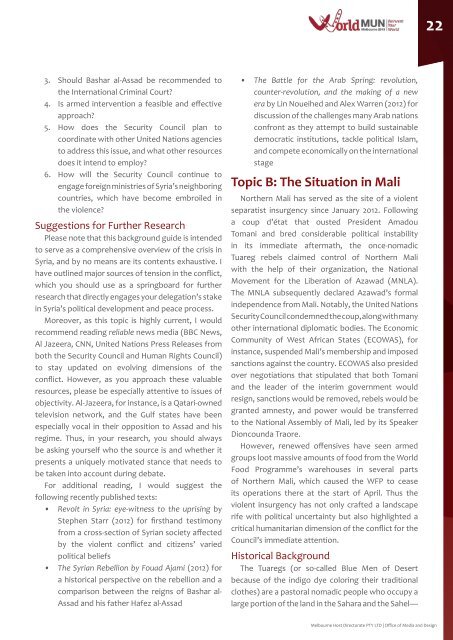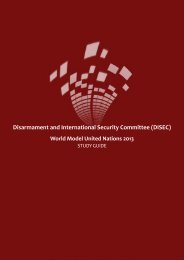Security Council - World Model United Nations
Security Council - World Model United Nations
Security Council - World Model United Nations
You also want an ePaper? Increase the reach of your titles
YUMPU automatically turns print PDFs into web optimized ePapers that Google loves.
3. Should Bashar al-Assad be recommended to<br />
the international Criminal Court?<br />
4. Is armed intervention a feasible and effective<br />
approach?<br />
5. How does the <strong>Security</strong> <strong>Council</strong> plan to<br />
coordinate with other united <strong>Nations</strong> agencies<br />
to address this issue, and what other resources<br />
does it intend to employ?<br />
6. How will the <strong>Security</strong> <strong>Council</strong> continue to<br />
engage foreign ministries of Syria’s neighboring<br />
countries, which have become embroiled in<br />
the violence?<br />
Suggestions for Further Research<br />
Please note that this background guide is intended<br />
to serve as a comprehensive overview of the crisis in<br />
Syria, and by no means are its contents exhaustive. I<br />
have outlined major sources of tension in the conflict,<br />
which you should use as a springboard for further<br />
research that directly engages your delegation’s stake<br />
in Syria’s political development and peace process.<br />
Moreover, as this topic is highly current, I would<br />
recommend reading reliable news media (BBC News,<br />
Al Jazeera, CNN, <strong>United</strong> <strong>Nations</strong> Press Releases from<br />
both the <strong>Security</strong> <strong>Council</strong> and Human Rights <strong>Council</strong>)<br />
to stay updated on evolving dimensions of the<br />
conflict. However, as you approach these valuable<br />
resources, please be especially attentive to issues of<br />
objectivity. Al-Jazeera, for instance, is a Qatari-owned<br />
television network, and the Gulf states have been<br />
especially vocal in their opposition to Assad and his<br />
regime. thus, in your research, you should always<br />
be asking yourself who the source is and whether it<br />
presents a uniquely motivated stance that needs to<br />
be taken into account during debate.<br />
For additional reading, i would suggest the<br />
following recently published texts:<br />
• Revolt in Syria: eye-witness to the uprising by<br />
Stephen Starr (2012) for firsthand testimony<br />
from a cross-section of Syrian society affected<br />
by the violent conflict and citizens’ varied<br />
political beliefs<br />
• The Syrian Rebellion by Fouad Ajami (2012) for<br />
a historical perspective on the rebellion and a<br />
comparison between the reigns of Bashar al-<br />
Assad and his father Hafez al-Assad<br />
• The Battle for the Arab Spring: revolution,<br />
counter-revolution, and the making of a new<br />
era by Lin Noueihed and Alex Warren (2012) for<br />
discussion of the challenges many Arab nations<br />
confront as they attempt to build sustainable<br />
democratic institutions, tackle political Islam,<br />
and compete economically on the international<br />
stage<br />
Topic B: The Situation in Mali<br />
Northern Mali has served as the site of a violent<br />
separatist insurgency since January 2012. Following<br />
a coup d’état that ousted President Amadou<br />
Tomani and bred considerable political instability<br />
in its immediate aftermath, the once-nomadic<br />
Tuareg rebels claimed control of Northern Mali<br />
with the help of their organization, the National<br />
Movement for the Liberation of Azawad (MNLA).<br />
The MNLA subsequently declared Azawad’s formal<br />
independence from Mali. Notably, the <strong>United</strong> <strong>Nations</strong><br />
<strong>Security</strong> <strong>Council</strong> condemned the coup, along with many<br />
other international diplomatic bodies. The Economic<br />
Community of West African States (ECOWAS), for<br />
instance, suspended Mali’s membership and imposed<br />
sanctions against the country. eCOWAS also presided<br />
over negotiations that stipulated that both Tomani<br />
and the leader of the interim government would<br />
resign, sanctions would be removed, rebels would be<br />
granted amnesty, and power would be transferred<br />
to the National Assembly of Mali, led by its Speaker<br />
dioncounda traore.<br />
However, renewed offensives have seen armed<br />
groups loot massive amounts of food from the <strong>World</strong><br />
Food Programme’s warehouses in several parts<br />
of Northern Mali, which caused the WFP to cease<br />
its operations there at the start of April. thus the<br />
violent insurgency has not only crafted a landscape<br />
rife with political uncertainty but also highlighted a<br />
critical humanitarian dimension of the conflict for the<br />
<strong>Council</strong>’s immediate attention.<br />
Historical Background<br />
the tuaregs (or so-called Blue Men of desert<br />
because of the indigo dye coloring their traditional<br />
clothes) are a pastoral nomadic people who occupy a<br />
large portion of the land in the Sahara and the Sahel—<br />
22<br />
Melbourne Host Directorate PTY LTD | Office of Media and Design
















